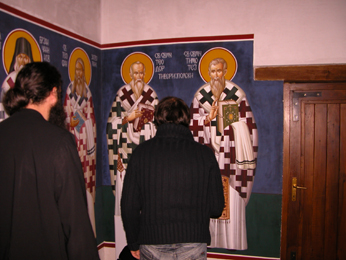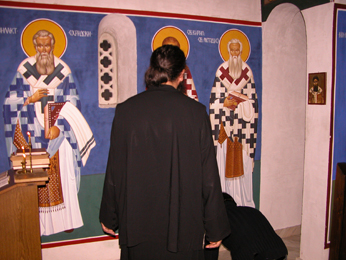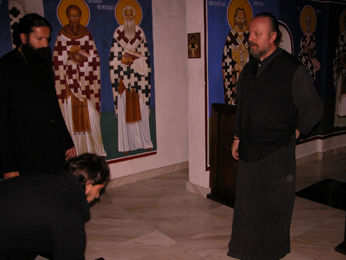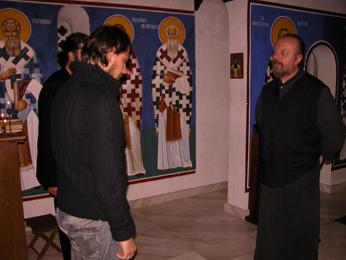Consistence ( 03.05.2009 )






Consistence
Children, today we venerate the day of the myrrh-bearing women. If I should ask you now what you, who more or less know their life, would choose as most characteristic in their whole struggle for service to the Godman Christ, what would you say? Is it not the unwavering and constant following of Christ, regardless of what is happening to Him and regardless of what consequences may arise for them personally? Is it not their attitude to God characteristic of the children of God, as opposed to that of the slaves and hired servants?
Someone has nicely said somewhere that the more we get closer to
Although we are well familiar with these types of behavior from our everyday life, too, with the negative choice in particular, let us nonetheless dwell on them for a little while. Folk wisdom as well has marked them in the saying: when the going gets tough, the tough get going. A recently heard dialog between two warriors has also made a great impression on me. When the one asks the other why they fought at all in a battle for which they had known in advance it had been lost, the latter answers, “It was harder to run away than to fight”. What can I say, true food for every fighting spirit. and we are fighting in a war of which we know in advance that Christ has won it and in which He has won for us. Not in some earthly sense, yet this is another subject. The myrrh-bearing women show us the way. I do not know, our Lord Himself indicates them as an example. And there will be someone again to ask why women…? Enough, though, about this. The question is: how do we reach to such inner foundation that makes possible, if necessary, even such outward behavior as we see in the myrrh-bearing women?
Some will say that love is most important on this road, some will say faith and some will. I would not talk of love among us, since about it, in the full sense of the word, is spoken among the perfect, for instance, among the myrrh-bearing women. I would neither talk about faith, since it, at the beginning, is implied. I would now talk only about will; we need it from the beginning of our spiritual life all until its perfection. As someone has put it: Will is what makes Saint Anthony greater in God’s eyes than the other monastics of that time and us today, while in all else he is like all of us. The will directed towards fulfillment of God’s commandments regardless of the difficulties we encounter at that is what makes slaves and hired servants (according to their attitude to God) become God’s children. Still, in what case and when should we exert ourselves and resolutely manifest this will?
We all know that at the beginning of our spiritual life God’s grace openly and clearly supports us in our struggle and then all seems easy—prayer, fasting, obedience, love. And we have all acquired the experience that afterwards it hides itself from us, or secretly supports us in our struggle, and further on all seems hopelessly hard to us. Something similar happens at the stage of illumination as well. Grace can manifest itself in the heart so strongly and attract the mind to itself so strongly, so that, regardless of what the man is doing or what is going on around him, the prayer can run from within. And, grace can hide itself so much, so that all of a sudden of great importance become certain outward conditions and assisting methods for accomplishment of the mind-and-heart prayer, such as: silence, isolated and dark place, sitting low, synchronized breathing etc.—something the man did not previously pay attention to.
What is important for us, children, is that the Lord gives us these periods of hiding of God’s grace for our spiritual growth and perfection. Whenever we abandon our struggle in the period when grace is hidden, we act as hired servants and merchants. And vice versa, whenever we continue with our struggle in the period when grace is hidden, we act as children of God. These periods can be shorter and more frequent, usually at the beginning of their occurrence. And, it can be a long period, too, usually at the end of the struggle at a given stage of the spiritual development. I am talking to you about the hiding of grace that happens for the sake of our growth, not about the leaving of grace that happens because of our sins. In order to attain continuity in our struggle, what helps us most is our will inspired by our mind, by our spiritual reason. Hence, we must exert ourselves through our firmly manifested will to continue the appropriate struggle also in the period when grace secretly acts within us, regardless of how long it will last.
I would like to tell you one more thing as a comfort to end with. When you see the period of grace’s hidden activity continue and when all becomes much difficult to you, and you nonetheless do not abandon the usual and appropriate struggle but rather intensify it, you should know that you are at the end of the spiritual growth at your level. The continuity in the struggle in a longer and extremely hard period of hiding of grace is a sign that the transition from one to another stage of spiritual growth is quite close. The abandonment of the struggle in a period when grace is hidden from us is a sign that we still live as hired servants and that we will not get yet what the children of God are entitled to, the true and legitimate heirs to the Tradition of their Heavenly Father. The myrrh-bearing women, along with the Theotokos, were first to hear the news about Christ’s resurrection and the first to touch the Risen Godman.
Metropolitan Nahum of Strumica